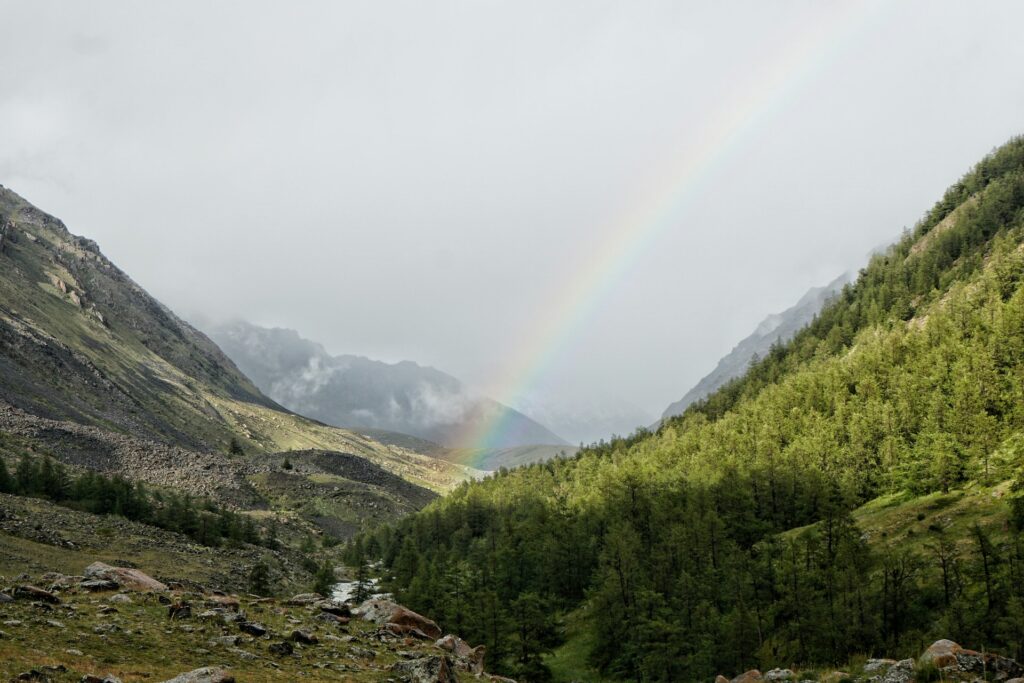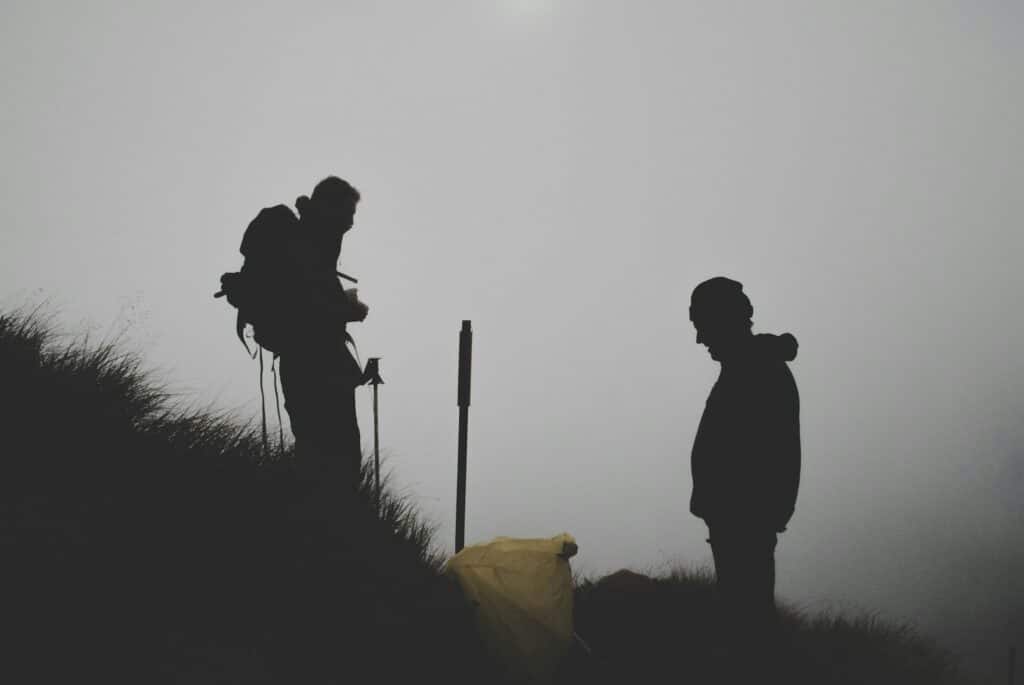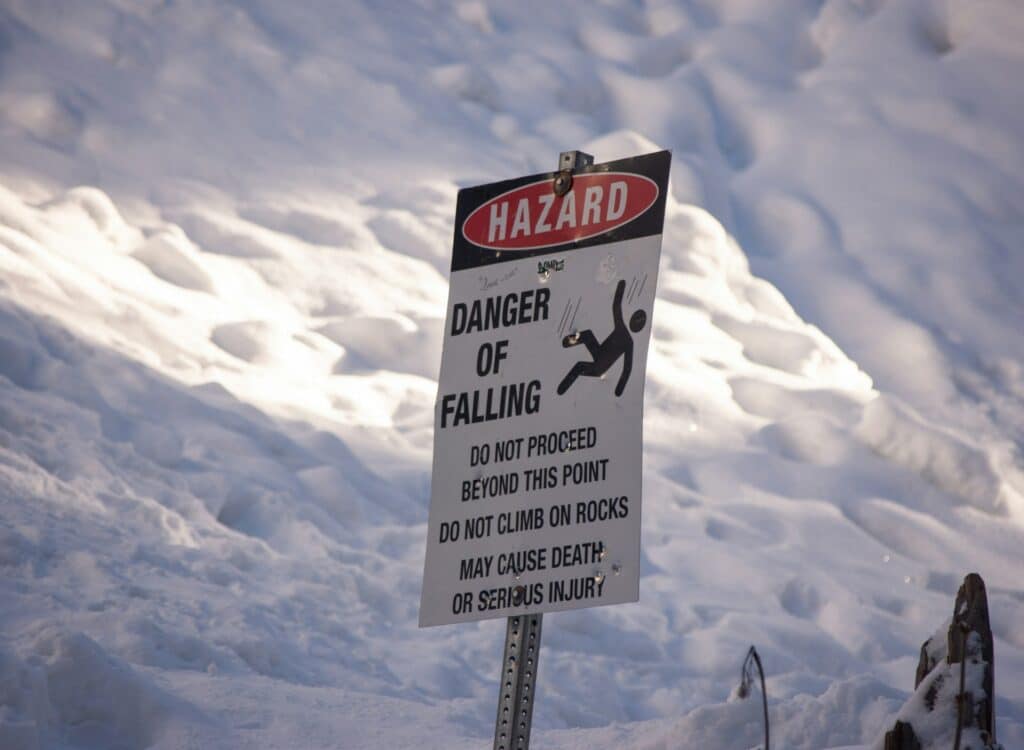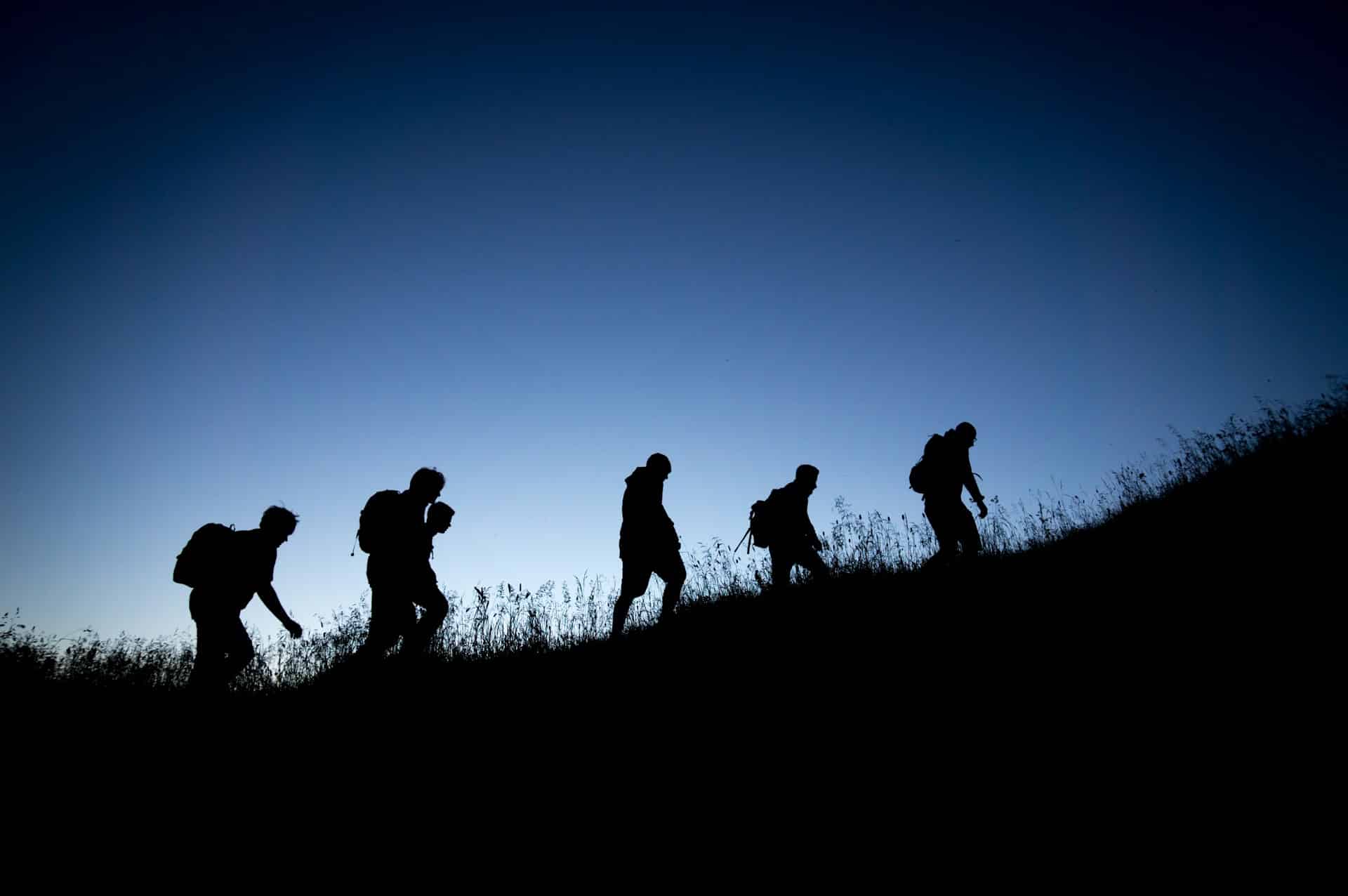The “wallow walk” is a process that allows us to experience constructive misery while hiking.
You don’t know why you need that because nobody ever told you. It’s an important and highly beneficial exercise we’ve championed for several years. You’re not likely to find anyone else talking about this.
And that’s because of our contemporary addiction to destructive positivity, so let’s get past that and onto some real stuff.
Conventional Wisdom

Go ahead and search up the benefits of hiking and you’ll get the oft-repeated talking points about enhanced physical fitness, improved mood, and more opportunities for socialization. All very good stuff, but hardly the whole story.
Less frequently mentioned is how we might access our spirituality through hiking, or the intellectual opportunities that hiking presents if we choose to make a study of the wilderness that surrounds us. We won’t be discussing either of those things in this post (we have several other articles on the topic), but we present these omissions as proof that the mainstream conversation about the benefits of hiking misses some very important realities.
In these breathless endorsements of hiking and its benefits, a lot of the information is presented without acknowledging that hiking can be hard.
Doing something new requires overcoming a lot of inertia. You might have to get up early. For the city-dwelling novice, there’s the difficulty of finding and negotiating the trailhead, and it’s not a simple thing to leave one’s familiar bubble for parts unknown. All of this is easier if you have supportive friends and family, but if you’re trying to make a lifestyle change that includes hiking on the regular, can you depend on them to get out there with you consistently?
Then there’s the trail itself.
Some are more difficult than others and conventional wisdom suggests taking it slow, avoiding lots of elevation gain, planning for breaks, protecting yourself from sun exposure, and bringing plenty of water. This is all very good advice, but again, rarely is that advice presented with the acknowledgement that some of this is tedious and mistakes will be made. You’ll get burned. You’ll get lost. Your legs will be sore. A bug will bite you. Your joints will hurt. You will run out of water (or forget it in the car).
And when these things happen, we’ve got that many more empirical reasons to avoid hiking in the future. The benefits were oversold with no acknowledgement of the challenges associated with the undertaking. When the inherent difficulties of hiking are obscured, some of us will blame ourselves as being exceptionally bad at something that everyone else seems to be enjoying without any trouble. We’re too inexperienced, too old, too out of shape we might think to ourselves, and we don’t have access to the networks or cultural support systems that might help to normalize the challenges of getting outside.
We need to put aside all of the misguided optimism meant to encourage others long enough to validate the often very negative experiences and associations people have with outdoor recreation. But that’s hard to do when we spend so much of our own time and energy gagging the dark frustrations within ourselves.
We all know that life is hard.
We all know that misery loves company.
Is there a constructive way to benefit from that communal awareness of rigor and hardship being intrinsic to the human experience?
Hiking as Shadow Work

We like Carl Jung around here. We certainly don’t believe everything he says, but his ideas show up in our experience often enough to take him seriously. And one of his principles that we endorse is the acknowledgement and embracing of our “shadow” selves.
Radically oversimplified, our “shadow” is the repressed part of our self that often shows up in the negative feelings we have about others. There is a popular trope, for example, about homophobic people being secretly gay. From a Jungian perspective, somebody exhibiting exaggerated revulsion when presented with another person’s choices, behaviors, or beliefs suggests the possibility of a profoundly frustrating internal struggle. It’s not just about disagreeing with others. This is a threat-response that feels visceral and personal.
Negative self talk is another potential clue to the nature of our repressed, shadow self, and this is what the remainder of our discussion will focus on.
We are often, wrongly, told to ignore negative self talk. This is about as helpful as being told to ignore our headache or a twisted ankle. Just like physical pain, our negativity bias is, at its root, protective.
When we twist our ankle, the pain we feel when we attempt to bear weight is a signal that we should avoid doing so. This is our body communicating to us about how to prevent exacerbation of the injury. Similarly, negative self talk is often meant to protect us from taking risks that might not pay off.
The social consequences of speaking truth to power are significant, for example, as is publishing a book on a topic that you’re passionate about, or asking a man for his daughter’s hand in marriage. Negative self talk will remind you that you are an inarticulate hypocrite with no business telling others about anything with your own house so far out of order.
And no, loser. You can’t marry my daughter.
The safe choice is to avoid any risk of criticism, backlash, or public scrutiny and just keep quiet.
That protective cue is not to be ignored or dismissed. It should be embraced and valued for its protective intent. And that negative self talk should be considered along with information brought into play by our ethics, intellect, experience, and the sense of urgency as it relates to the task at hand. When the things that need doing are big and scary and risky, we are going to be assailed with lots of negative self talk.
But the big scary things still need to be done.
Or at least attempted. By someone at some time.
Are we that someone? Is this the time?
Our negativity bias seeks clarity on those questions by asking whether or not we are prepared to accept the consequences of our actions.
Are we prepared to fail?
The Wallow Walk

Welcoming negative self talk in a controlled manner and within a specific context is an opening to internal clarity and external empathy. As we acclimate to the protective function of our negativity bias, we gain personal insights that allow us to connect with others through shared fears and disappointments. We affirm each other and commit to learning from our resistance rather than shutting down entirely.
Here’s what I do.
When I’m hiking or backpacking and I see a big hill coming up with those enormous switchbacks that seem to go on forever, threatening to suck the breath, joy, and vitality out of me completely- that’s when I choose to “wallow walk.”
The first step is to slow down.
I’m not in competition with anyone, least of all myself. I let my heart and lungs determine the pace. If I can’t talk comfortably while walking, I’m going too fast. Depending on how steep the climb is, my pace may be absolutely glacial.
That’s fine, as long as it is relentless.
That’s the second step, the choice to not stop. No breaks. I commit to putting one foot in front of the other, slowly but absolutely. My steps may veer from one side of the trail to the other, but that’s fine. A crooked line takes longer, but as long as I continue to honor my promise to keep moving, I’ll get to where I need to go, insha Allah.
The third step is to indulge in negative self talk.
Embrace the suck. The uglier the better.
I want to remind myself of just how completely worthless I am. Not merely insignificant, but an actual problem that the world would be better off without. I want to to remind myself how withered, ugly, weak, and revolting I am. I want to revisit every rejection, every broken heart, and every missed opportunity, reminding myself that all of it was justified because nothing good could ever coexist in the same material plane as the one blighted by my presence.
You get the idea.
Sounds pretty awful. Maybe even dangerous. But here’s what’s going on because it’s easy to miss.
At the most basic level, I am encouraging alignment between my physical and emotional states. It is a waste of energy to pretend that I am having a great time climbing a massive, exhausting hill. Unless I am, of course.
But that’s unlikely. Therefore I am intentional about fomenting within myself a constructive misery conditioned by my primary commitment:
Relentless forward progression.
My walking persists irrespective of my wallowing. The decision to keep putting one foot in front of the other is not simply a physical choice. I am committing to action despite anything my unfettered negative self talk throws at me.
And there is nothing that anyone anywhere will ever say about me that I haven’t already said and believed about myself. And I’ll bet I’m not alone in that regard. If we can choose to do the things that need to be done despite the warnings of our most intimate adversary, there’s really nothing else to stop us.
Finally, I am listening for clues to my shadow self within the ramblings of my negative self talk. Suppression of this dark monologue feels horribly analogous to the repression that keeps us ignorant and apprehensive about the fears, biases, and urges lurking just beneath the surface of our awareness.
We cannot address what we do not know.
Beware

This is probably not for everybody.
There are fragile psyches out there, people who are suicidal, survivors of horrible abuses. Please prioritize your self-knowledge, intuition, and the counsel of people who love and care about you over a blog post from someone who likes to call himself “Chief Elder.”
And please recognize that wallow-walking has a very specific context and application.
This takes place outside, on trails, in the places that we consider both medicinal and angelic. Ideally, we are in the company of others. The exercise of wallow-walking is restricted to those parts of the hike that are physically demanding to the point of actual discomfort.
My Muslim brothers and sisters may wonder why I wouldn’t advocate supplication on a difficult climb, the offering of dhikr in the form of some mouthed litany. If I’m not advocating it, neither am I suggesting to avoid it. Some may find doing so beneficial, though I often reserve liturgical expressions for easier going.
I have two reasons for that.
Where I have the option, I don’t find it helpful to link formal religious practice with experiences that are unpleasant. It affirms a tendency among many that religious practice is, by definition, a rigorous exercise in constant, suffocating self-mortification. I am not immune to that framing.
Understanding this tendency among his flock, the Prophet Muhammad is reported to have said, may the peace and blessings of God be upon him:
Religion is very easy and whoever overburdens himself in his religion will not be able to continue in that way.
Bukhari
Secondly, the choice to be outside, in difficulty, and to persist regardless of that difficulty is itself a form of Divine remembrance (dhikr). I do not feel the need to further sacralize what I believe is already an act of worship.
But if I top out, if I finish the climb, then I’ll grab a snack and take in the view. In those moments, you better believe that all of the vitriol I’ve been spewing at myself gives way immediately, automatically to shukr and hamd, praise and gratitude for the All that is not me.
Completion of the task reframes the negative self talk that was my companion along the way and a realization becomes evident:
I am no longer the point.
I was never the point.
Success and failure are markers of growth and alignment with God’s Will and Command. That’s the point.
Success is what lies at the intersection of personal intention and Divine decree. Muslims understand this as tawfiq, and while the attribution of outcomes is only ever to God alone, we assume responsibility regardless to make a closer study of consequence.
Failure is proof that we are trying to learn.
Success is merely an indication of different lessons to come.
Leave a comment below for posterity or join us in the D&T Chautaqua Discord to discuss this post with other adventurous spirits from around the world.

“reminding myself that all of it was justified because nothing good could ever coexist in the same material plane as the one blighted by my presence”
What a beautiful sentence. Ruthless!
I’ve done something like this, unintentionally, before. But not while hiking. I got home after a long work day and instead of doing some other necessary things at home, I got distracted for an hour on youtube and the news. I know that the underlying reason was that I was just avoiding the tasks cuz it all seemed so much. I was so mad at myself because all I was doing was making it worse. So I got up and just started doing things and yelling at myself for always falling into this trap. I told myself to shut up and called myself an idiot anytime I paused for a moment overthinking if I should do this or that, and instead just did something, whatever my arm reached for first. I had some constructive negativity in there too. And everything was done before I knew it. Sometimes that’s just the energy you need. And simply going non-stop.
Make it intentional next time!
(but include somewhere that you are loved by me and many others, masha Allah)
Will do, inshallah!!!
Really thought provoking article. It’s a cool but increasingly rare opportunity to walk for a bit in the shoes of someone with a completely different perspective and experience. I can’t say I’ve ever had a wallow walk like that before, but it sounds a lot like emotional behavioral therapy in the sense of experiencing intense emotion and using movement to tell your body that you are past the pain now. Almost as though you are literally walking away from it step by step and leaving it behind.
This is such an insightful comparison, masha Allah! Let’s talk about it on Discord 🙂